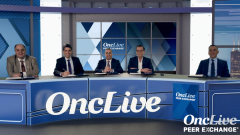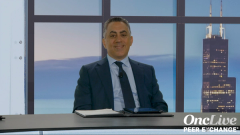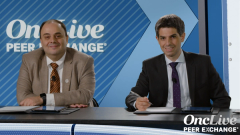
Role of Hepatitis Status in Selecting Therapy for HCC
Expert panelists briefly review how a patient’s hepatitis status may influence treatment selection for advanced hepatocellular carcinoma.
Episodes in this series

Transcript:
Tanios Bekaii-Saab, MD: Pierre, I want to discuss the origin of the liver disease, hepatitis B, C, and NASH [nonalcoholic steatohepatitis]. How do you navigate the instigating element there as it relates to immune therapy? Because we hear a lot of hepatitis B is favorable, hepatitis C is not, and NASH we don’t know. What are your thoughts?
Pierre Gholam, MD: This has been a question that people have asked since the very beginning of the modern era of effective therapy for HCC [hepatocellular carcinoma]. I think all of the folks here in this audience, maybe except for Mark, remember back in the day when sorafenib came out there was an impression that even in the early days of SHARP and Asia-Pacific [trials], there was an enhanced response in patients who had viral hepatitis. There were studies, some of which I participated that showed that sorafenib has a weak antiviral activity, and reduces hepatitis C viral load by perhaps a half log. This has continued as TKIs [tyrosine kinase inhibitors] came to the forefront. There seems to be a similar impression, even with IO [immuno-oncology] therapy, that a viral hepatitis as an ideology sets you up for a better outcome than nonviral hepatitis, AKA fatty liver disease. Let’s be real here, that’s the bulk of what nonviral hepatitis is. This issue is at the same time important and also poorly understood. The best attempt to understand this at some granularity came from the folks in Germany, Mathias Heikenwälder [, Prof.Dr,] and his group have this paper in Nature, which is very much talked about, and shows that in the setting of fatty liver disease, CD8+, PD1+, T cells seem to drive carcinogenesis in the setting of fatty liver disease, perhaps set you up for a worse outcome by dampening the response to IO therapy. That group has taken this a step further and has analyzed multiple studies including KEYNOTE-240 [NCT02702401], IMbrave150 data [NCT03434379], and has shown what we already knew, which was that the response was less in people who had nonviral hepatitis compared to viral hepatitis. Does that mean that I would make different treatment decisions if I had a patient in front of me who had NAFLD, nonalcoholic fatty liver disease, in terms of deciding what treatment option to give them? Within the parameters that Mark and Anthony have outlined, I would do the same thing, but it’s an important question because fatty liver disease has become the leading cause of liver disease worldwide. Hepatitis C is on the decline because it is universally curable and soon will not be a major issue.
Transcript edited for clarity.








































